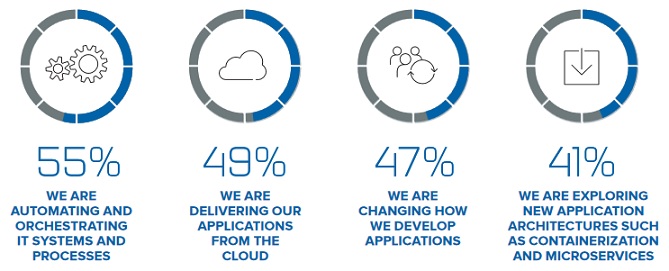StackGen has partnered with Google Cloud Platform (GCP) to bring its platform to the Google Cloud Marketplace.
Accelerating multi-cloud deployments are enabling organizations to select the cloud platform that best meets the requirements of a specific application, according to the 2018 State of Application Delivery report from F5 Networks. However, this also increases the challenges many companies face in managing operations and security across multiple clouds as they transform their application portfolio to compete in the digital economy.
Respondents made clear they are heavily focused on building the foundation necessary for application driven digital transformation. As a result, many are moving toward multi-cloud environments that will enable them to reinvent themselves as platforms for competitive differentiation and innovation, helping create business success in the digital economy.
Over 3,000 IT, networking, application, and security professionals from around the world weighed in on application delivery topics ranging from public and private cloud and multi-cloud adoption; to rising security challenges; to automation, orchestration, and the future of enterprise application services. Here are some highlights:
■ Digital transformation inspires new architectures and IT optimization initiatives: Optimizing IT infrastructure and processes remains the primary driver for digital transformation projects, according to 72 percent of respondents, while nearly half said digital transformation is encouraging the delivery of applications from the cloud (49 percent). Furthermore, 47 percent stated that it is changing how they develop applications, and 41 percent reported exploring new application architectures such as containers and microservices.

■ Multi-cloud enables the “best cloud for the app” strategy: Most organizations pursue a best-of-breed strategy for each application deployment, leading to multi-cloud architectures. Nearly nine in ten respondents reported using multiple clouds (87 percent), with 56 percent saying cloud decisions are made on a per application basis.
■ Application services are the gateways to the future: On average, organizations take advantage of 16 different application services to keep their apps fast, safe, and available. Security is still the most important application service, but gateway services emerged as a critical need this year as IT organizations prepare for the digital economy. Four of the top five services organizations plan to deploy in the next 12 months are application gateway services, including SDN, API, IoT and HTTP/2.
■ Security confidence falls as multi-cloud rises: Digital transformation drives organizations to deliver more apps from the cloud, yet organizational confidence to withstand an attack has taken a hit due to lack of experience and expertise in securing applications deployed in public clouds. In fact, this year 28 percent said protecting applications is a top security challenge. This has led to an increase in organizations deploying Web Application Firewalls (WAFs), with 70 percent saying they have one deployed and another 19 percent planning to deploy in the next 12 months.
■ Automation and orchestration: Full steam ahead: IT is embracing programmability—and standardizing on their automation and orchestration environments—to realize leaner IT with the goal of reducing OpEx. Nearly three in four (74 percent) of respondents declare the use of automation in the operation of IT infrastructure to be “somewhat” or “very” important. The majority (70 percent) are using automation to realize leaner IT with the goal of reducing OpEx, while over half (51 percent) are looking to scale to meet demand.
Industry News
Tricentis announced its spring release of new cloud capabilities for the company’s AI-powered, model-based test automation solution, Tricentis Tosca.
Lucid Software has acquired airfocus, an AI-powered product management and roadmapping platform designed to help teams prioritize and build the right products faster.
AutonomyAI announced its launch from stealth with $4 million in pre-seed funding.
Kong announced the launch of the latest version of Kong AI Gateway, which introduces new features to provide the AI security and governance guardrails needed to make GenAI and Agentic AI production-ready.
Traefik Labs announced significant enhancements to its AI Gateway platform along with new developer tools designed to streamline enterprise AI adoption and API development.
Zencoder released its next-generation AI coding and unit testing agents, designed to accelerate software development for professional engineers.
Windsurf (formerly Codeium) and Netlify announced a new technology partnership that brings seamless, one-click deployment directly into the developer's integrated development environment (IDE.)
The Cloud Native Computing Foundation® (CNCF®), which builds sustainable ecosystems for cloud native software, is making significant updates to its certification offerings.
The Cloud Native Computing Foundation® (CNCF®), which builds sustainable ecosystems for cloud native software, announced the Golden Kubestronaut program, a distinguished recognition for professionals who have demonstrated the highest level of expertise in Kubernetes, cloud native technologies, and Linux administration.
Red Hat announced new capabilities and enhancements for Red Hat Developer Hub, Red Hat’s enterprise-grade internal developer portal based on the Backstage project.
Platform9 announced that Private Cloud Director Community Edition is generally available.
Sonatype expanded support for software development in Rust via the Cargo registry to the entire Sonatype product suite.
CloudBolt Software announced its acquisition of StormForge, a provider of machine learning-powered Kubernetes resource optimization.













